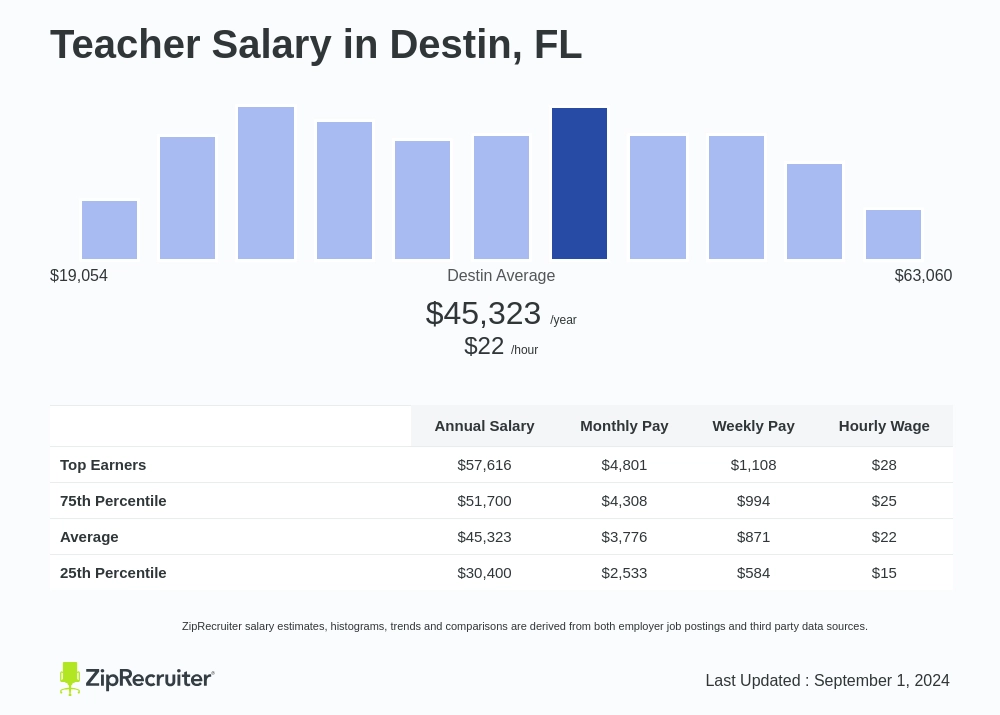Teaching is a noble profession that plays a crucial role in shaping the future of our children. It’s important to understand how much do teachers make in Florida, as this can greatly influence the quality of education and the motivation of those who choose to enter this field. In this article, we will explore the salaries of teachers in Florida, the factors that affect their earnings, and what aspiring educators can expect when they pursue a career in teaching in this state.
The Basics of Teacher Salaries in Florida
When we talk about how much do teachers make in Florida, it’s essential to recognize that salaries can vary widely. The average salary for a teacher in Florida is influenced by several factors, including their level of education, years of experience, and the district in which they work. Generally, Florida teachers earn between $40,000 and $60,000 annually. However, those who work in larger districts or have advanced degrees can earn significantly more.also read Where is the Big Bend in Florida?
Starting Salaries for New Teachers
For new teachers just entering the field, salaries can be on the lower end of the spectrum. In Florida, a beginning teacher with a bachelor’s degree can expect to earn approximately $40,000 to $45,000 in their first year. This starting salary can be slightly higher in some counties, especially in urban areas where the cost of living is higher.
For example, Miami-Dade County Public Schools, one of the largest school districts in Florida, has a starting salary around $47,000 for new teachers. This higher starting salary reflects the district’s effort to attract qualified educators in a competitive job market.
Experience Matters: Salary Increases Over Time
As teachers gain experience, their salaries typically increase. Most school districts in Florida have a step pay scale that rewards teachers for their years of service. For example, teachers may receive annual raises based on their performance evaluations and longevity. After five years of teaching, a teacher’s salary can increase to around $50,000 to $55,000.
The Impact of Advanced Degrees
Another factor that significantly affects how much do teachers make in Florida is their level of education. Teachers who pursue advanced degrees, such as a master’s or doctorate, can earn substantially more. Many school districts offer salary supplements for teachers with advanced degrees. For example, a teacher with a master’s degree can earn an additional $3,000 to $5,000 per year on top of their base salary.
Different Roles Within Education
It’s also important to recognize that not all teachers are in the same role. Teachers who take on additional responsibilities, such as coaching, leading extracurricular activities, or serving as department heads, may receive extra pay for their duties. This can lead to a significant boost in their overall earnings.
The Importance of Location
Where a teacher works in Florida can also affect their salary. Generally, urban districts tend to pay more than rural districts. This is due to the higher cost of living in cities and the increased demand for teachers in larger populations.
For example, districts like Hillsborough County (Tampa area) and Orange County (Orlando area) typically offer higher salaries compared to smaller, rural counties. This makes it essential for teachers to consider the location when looking for a job in Florida.
Benefits and Perks for Florida Teachers
While the salary is a critical factor when considering a teaching career, it’s also important to look at the benefits and perks that come with the job. In addition to their base salary, teachers in Florida typically receive benefits that can add substantial value to their overall compensation.
Health Insurance
One of the most significant benefits for teachers is health insurance. Many school districts in Florida offer health insurance plans that cover a portion of the premium costs. This can save teachers hundreds of dollars each month, making their overall compensation more competitive.
Retirement Plans
Florida teachers also benefit from retirement plans. The Florida Retirement System (FRS) provides a pension plan for teachers, which can be a valuable asset for those planning for their future. Teachers contribute to their retirement plans through payroll deductions, and many districts offer additional options for supplemental retirement savings.
Paid Time Off
Paid time off is another perk for teachers in Florida. Most districts offer paid vacation days, sick leave, and personal days. These benefits provide teachers with the necessary time to recharge and take care of personal matters without losing income.
Professional Development Opportunities
Many school districts in Florida also invest in professional development for their teachers. This can include workshops, conferences, and additional training sessions, which not only help teachers improve their skills but can also lead to salary increases.
Additional Incentives
Some districts in Florida have implemented incentive programs to attract and retain teachers. These programs may include bonuses for teachers who work in high-need subjects, such as math and science, or for those who teach in underserved areas.
Challenges Facing Florida Teachers
While there are many benefits to being a teacher in Florida, it’s important to acknowledge the challenges that educators face. Understanding these challenges can provide a more comprehensive view of how much do teachers make in Florida and why their compensation may not always reflect the demands of their jobs.
Workload and Stress
Teachers in Florida often face high workloads, with many working long hours beyond the school day. This can lead to stress and burnout, which can impact their overall job satisfaction. Many teachers find themselves spending evenings and weekends grading papers, preparing lesson plans, and attending meetings.
Classroom Size
Classroom sizes in Florida can also pose challenges for teachers. Larger class sizes can make it difficult to provide individual attention to students and may increase the workload for teachers. This can lead to frustration and a sense of being overwhelmed.
Funding Issues
Another significant challenge facing Florida teachers is funding for public schools. Budget cuts and funding disparities can limit resources available for teachers and students. This can affect the quality of education and make it more difficult for teachers to do their jobs effectively.
Teacher Shortage
Florida is currently experiencing a teacher shortage, which can add to the pressures faced by educators. Many districts struggle to fill vacancies, leading to larger class sizes and additional responsibilities for current teachers. This shortage can also impact salary negotiations, as districts may need to offer higher salaries to attract qualified candidates.
Conclusion
In conclusion, understanding how much do teachers make in Florida involves looking at various factors such as experience, education, location, and the specific district in which a teacher works. While the average salary ranges from $40,000 to $60,000, many teachers can earn more with experience and advanced degrees.
In addition to salaries, the benefits and challenges of being a teacher in Florida play a significant role in the overall compensation package. As society continues to recognize the importance of educators, there is hope for improved salaries and working conditions for teachers in the future.
By understanding these dynamics, we can better appreciate the valuable work that teachers do and advocate for their needs. Teaching is not just a job; it’s a commitment to shaping the future, and those who choose this path deserve our respect and support.





